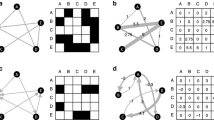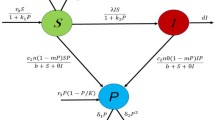Abstract.
We consider the impact of increased stochastic fluctuations on the extinction date of an unstructured population subject to either environmental or demographical stochasticity (or both). By modelling the population density as a general linear diffusion, we state a set of typically satisfied conditions under which the decreasing minimal r-excessive mapping (and, therefore, the moment generating function) of the considered diffusion process is convex and, consequently, under which the impact of increased stochastic fluctuations on the expected date at which the density becomes arbitrarily small is unambiguously negative. In other words, we establish a set of sufficient conditions under which increased stochasticity speeds up the extinction process independently of whether stochasticity is environmental or demographic. In this way, we are able to confirm that increased stochasticity is detrimental for population growth.
Similar content being viewed by others
Author information
Authors and Affiliations
Additional information
Received: 25 April 2000 / Revised version: 18 April 2001 / Published online: 12 October 2001
Rights and permissions
About this article
Cite this article
Alvarez, L. Does increased stochasticity speed up extinction?. J Math Biol 43, 534–544 (2001). https://doi.org/10.1007/s002850100108
Issue Date:
DOI: https://doi.org/10.1007/s002850100108




